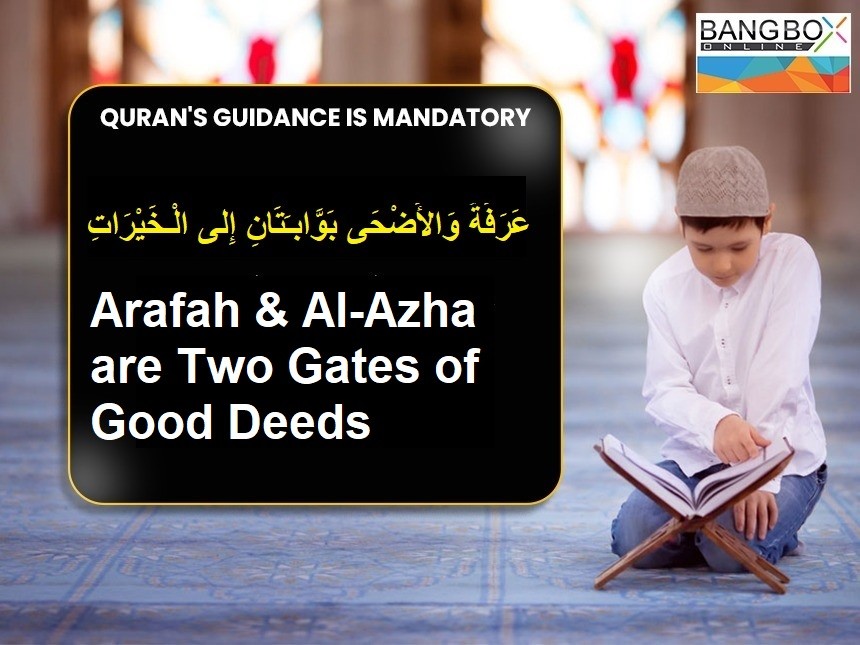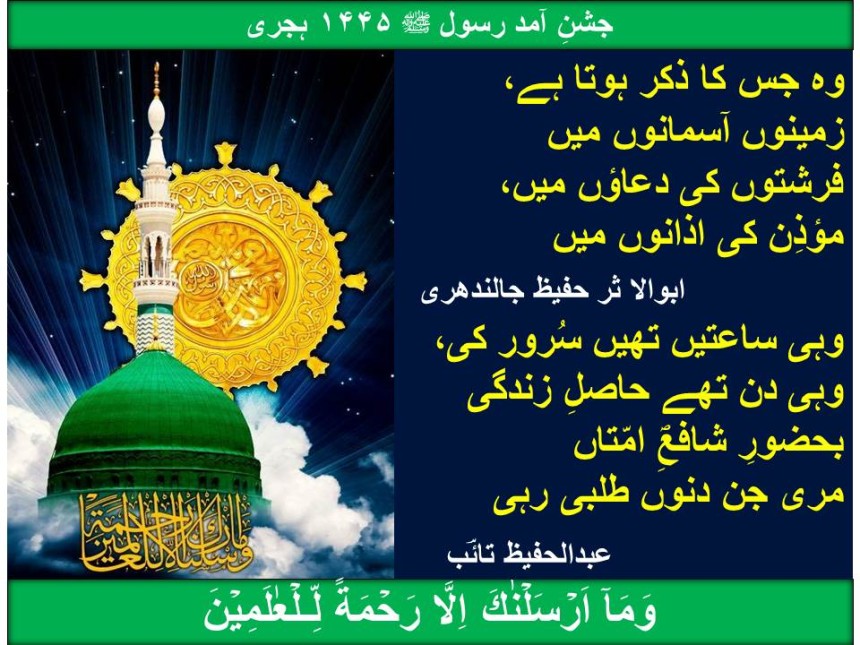
عَرَفَةُ وَالأَضْحَى بَوَّابـَتَانِ إِلى الْـخَيْرَاتِ Arafah and Al-Azha are two gates of good deeds
Holy Book Al Quran is the final Holy Book revealed upon the Last of Prophets Hazrat Muhammad (PBUH). The Quran & Sunnah is the only source of holy guidance as it entails detailed instructions for each and every walk of human life. Here a guidance from Quran for the followers of Islam” ( عَرَفَةُ وَالأَضْحَى بَوَّابـَتَانِ إِلى الْـخَيْرَاتِ : Arafah and Al-Azha are two gates of good deeds ) is discussed wrt Eid Ul Azha and the rituals of Hajj at Holy Makkah and Mina performed in the holy month of Zill Hajj for better living from Quran and Hadith of Prophet ﷺ. This is an approved Jumma Khutba from the Sultanate of Oman and translated in English.
بِسۡمِ ٱللهِ ٱلرَّحۡمَـٰنِ ٱلرَّحِيمِ
عَرَفَةُ وَالأَضْحَى بَوَّابـَتَانِ إِلى الْـخَيْرَاتِ
Arafah and Al-Azha are two gates of good deeds۔
Praise be to Allah, who has given us special days and nights of goodness and goodness, opened for us the doors of mercy, and preferred some days over all days because of their degrees and blessings, I praise Him. I am, and I am thankful for countless blessings spanning ages and years. We bear witness that there is no god but Allah alone, He has no partner, and we bear witness that Muhammad, may God bless him and grant him peace, is the servant of Allah and His Messenger, the Lord of the heavens and the earth and of all times. I am the Imam of those who are engaged in the worship of Allah. Blessings and peace be upon you, upon your family and companions, until the day of reward and reward - translation of the recited verse:
It is neither their meat nor their blood that reaches Allâh, but it is piety from you that reaches Him. Thus have We made them subject to you that you may magnify Allâh for His Guidance to you. And give glad tidings (O Muhammad SAW) to the Muhsinûn[] (doers of good). (37)
Surah Al Hajj – 37
O people of Allah, fear Allah - be righteous and obey Allah, I exhort you and yourselves to fear Allah. This is the path to prosperity and salvation.
So fear Allâh, O men of understanding in order that you may be successful. (100)
Surah Al Maeda – 100-Part
O believers, may Allah have mercy on me and you, know that the ten days of Dhu al-Hijjah are among the best and most complete days in the world and the good deeds done in it are better than others. The Messenger of Allah, may Allah bless him and grant him peace, said: "No good deeds are more beloved to Allah than these days, i.e. the ten days of Dhu al-Hijjah." Not even, except the man who went out with his life and wealth and did not return with anything of it.
These ten days of Dhu al-Hijjah are not only excellent, but the best of them is the Day of Arafat - don't you consider that the Messenger of Allah, may God bless him and grant him peace, paid special attention to it, besides Eid for Muslims. is the day of The Messenger of Allah, may God bless him and grant him peace, said: The Day of Arafah, the Day of Sacrifice and the days of Tashreeq are our Eid. Rather, Allah made the fasting of the Day of Arafah an expiation for two whole years of minor sins while avoiding major sins. On the authority of Sayyiduna Abu Qatadah, may Allah be pleased with him, the Messenger of Allah, may God bless him and grant him peace, said, "By fasting on the day of Arafat, I hope that Allah will make atonement for the year before it and the year after it."
O believers, what will benefit you when facing the Day of Arafah is to prepare yourself to use it in a way that will benefit you in terms of rewards from Allah, whatever they may be. The Prophet (peace and blessings of Allah be upon him) and his companions did not pass the day of Arafat without making use of it, they used to remember Allah and glorify Him. On the authority of Sayyiduna Ibn Umar (may Allah be pleased with him). On the morning of Arafat, we were with the Messenger of Allah, may Allah bless him and grant him peace, some of us glorified Allah and some of us praised Allah.
Sayyiduna Ibn Umar and Abu Hurairah, may Allah be pleased with them, used to go out in the bazaar saying Allahu Akbar in this decade of Dhu al-Hijjah and exhorting people to recite the Takbirs of Allahu Akbar. Arafah is one of the ten days of Dhu al-Hijjah, and the Prophet (peace and blessings of Allah be upon him) advised us to take advantage of these times, so increase your joy, glorification and praise in them.
O righteous servants of Allah, the one thing that you hope to meet on the day of Arafah in favor of me and all of you is to fast it and do a lot of good deeds on it. And be a guide and role model for your children and your families to achieve goodness in it, for it is the basis of succeeding in the Prophets and the righteous. In Surah Maryam, there is a divine statement:
And he used to enjoin on his family and his people As-Salât (the prayers) and the Zakât, and his Lord was pleased with him. (55)
Surah Maryam – 55
There is no doubt that this is the completion of the good deeds of the ten nights which Allah has sworn in this decree.
By the dawn; (1) By the ten nights (i.e. the first ten days of the month of Dhul-Hîjjah) [], (2)
Surah Al Fajr – 1-2
O people of Allah, after that is the day of Eid al-Adha, and it is narrated that the Messenger of Allah, may God bless him and grant him peace, said: Indeed, the most blessed and exalted day in the sight of Allah is the Day of Sacrifice. Then there is the day after that. The Day of Sacrifice is the day of Eid and the Day of Judgment is the day after it. Therefore, in it, happiness and the days of Eid, which are permissible and encouraged in the religion of Allah, are the gift and donation of Allah. Sayyiduna Anas (may Allah be pleased with him) says that when the Prophet (peace and blessings of Allah be upon him) came to Madinah, the people of Madinah had fixed two days in which they would celebrate and play games. You asked people, how are these two days? The Companions, may Allah bless them and grant them peace, said that in those days, we people used to celebrate and play in the era of Jahiliyyah. The Messenger of Allah, may God bless him and grant him peace, said, "Allah has changed these days of yours into two best days, i.e. Eid-ul-Adha and Eid-ul-Fitr." Narrated by Abu Dawud.
O servants of Allah, fear Allah - take advantage of these days in obedience to Allah, and be enlightened by His forgiveness, forgiveness and guidance.
========================================================
All praise is due to Allah, whatever is in the heavens and the earth, and to Him is all praise in the Hereafter, and He is the All-Wise, the All-Wise, and I bear witness that there is no god but Allah, and I bear witness. I grant that Muhammad, may God bless him and grant him peace, is the Messenger of God. Blessings and peace be upon the Messenger of God, upon his family, companions, and followers who follow in his footsteps.
Fear Allah's servants, O followers of your Prophet, know that the days of Eid al-Adha are approaching and there is no doubt that you are waiting to understand the commandments of sacrifices and want to know that this What is your financial status in the matter and what is your obligation? This desire is nothing but a proof of your love for your Prophet and your response and worship and glorification of Allah.
Thus it is [what has been mentioned in the above said Verses (27, 28, 29, 30, 31) is an obligation that mankind owes to Allâh]. and whosoever honours the Symbols of Allâh, then it is truly from the piety of the hearts. (32)
Surah Al Hajj – 32
It is a proven Sunnah for one who can afford to sacrifice, and it is a help to the poor of the Muslims, and a picture full of meanings of unity and communal harmony, the Prophet (PBUH) paid a sacrifice for every year. On the authority of Anas bin Malik, may Allah be pleased with him, it was narrated that he, may the peace and blessings of God be upon him, used to sacrifice a ram with two horns and would call upon it the name of Allah and say Allahu Akbar. . hands, placing your feet on their palms." And remember - O wise man - that sacrifice has conditions that must be fulfilled in order to bring oneself closer to Allah through it. Among them is this. That it is one of the categories specified by the sacred law, said our Lord:
And for every nation We have appointed religious ceremonies, that they may mention the Name of Allâh over the beast of cattle that He has given them for food.
Surah Al Hajj – 34-Part
Among the cattle are cows, sheep and camels, and it is beautiful, O righteous servant, when you draw near to Allah through your sacrifice. Sayyiduna Bara bin Azib (RA) said: The Messenger of Allah (PBUH) said: "Four types of animals are not permissible for sacrifice: the lame whose lameness is visible, the lame whose lameness is obvious, and the sick whose disease is obvious." And an animal so weak that it does not even have pulp. He (peace and blessings of Allah be upon him) said: Leave that which you dislike, but do not consider it haram. A sacrifice is not considered a sacrifice until it is slaughtered at its appointed time, and its time is from the tenth date after the Eid prayer to sunset on the third day.
Sayyiduna Bara bin Azib (may Allah be pleased with him) narrated that the Prophet (peace and blessings of Allah be upon him) gave a sermon on the day of sacrifice, so he said: “The first thing we should do on this day is to pray and then perform sacrifice. Whoever does this, then he has obtained our Sunnah, and whoever slaughters it before that, then it is only meat that he is offering to his family first. Sayyidina Abu Barda Ibn Nayar had slaughtered (before the prayer), so he said: Messenger of Allah! I had a one-year-old deer, which was better than a toothed deer, so he said: "Okay, but it will not be enough for anyone else after you."
Sayyiduna Anas Ibn Malik (RA) narrated that the Prophet (PBUH) sacrificed two rams with big horns with his own hands. (Slaughtering) He ﷺ slaughtered them with his holy hand because it is a very great act of worship, so he ﷺ performed it himself. While slaughtering, the Prophet ﷺ invoked the name of Allah to seek the help of Allah, so that blessings would descend from him and good would be done to him. He said Allahu Akbar to express the greatness of Allah and His majesty, to dedicate worship to Him alone, and to express weakness and humility before Allah, the Most High. Because according to the requirement of mercy on the slaughtered animal, it is required to remove its soul quickly and slaughter it in a good manner, so the Prophet (ﷺ) placed his blessed feet on their sides so that they could not move while slaughtering because of the movement. It may take longer for them to be slaughtered which causes them pain. Allah is very merciful to His creatures.
He says: Allah has written good things over everything, so when you slaughter, slaughter well, and each one of you should sharpen the weapons of his sacrifice, and his sacrifice should be with ease.
So, servants of Allah, fear Allah - eat from your sacrifices and feed others and give thanks to Allah, for our Lord said:
And the Budn (cows, oxen, or camels driven to be offered as sacrifices by the pilgrims at the sanctuary of Makkah.) We have made them for you as among the Symbols of Allâh, Wherein you have much good. So mention the Name of Allâh over them when they are drawn up in lines (for sacrifice). Then, when they are down on their sides (after slaughter), eat thereof, and feed the poor who does not ask (men), and the beggar who asks (men). Thus have We made them subject to you that you may be grateful. (36)
Surah Al Hajj – 36
وآخر دعوانا ان الحمد للہ رب العالمین- سبحان ربک رب العزة عما يصفون، وسلام على المرسلين والحمد لله رب العالمين


Signature Glo Gang Hoodies
https://theglogang.shop/product-category/hoodies/ Step into a world where streetwear isn'...

A Guide to NEBOSH Fee in Pakistan for Beginners
Pursuing a NEBOSH qualification is a worthwhile investment for individuals aiming to build...
